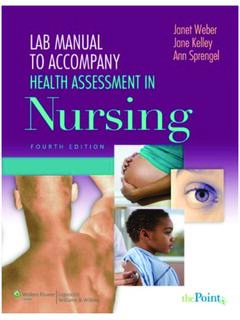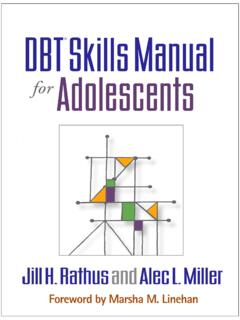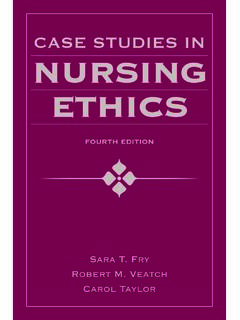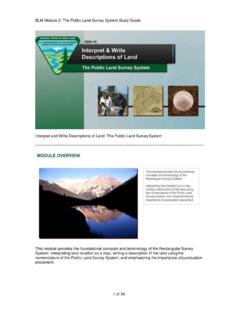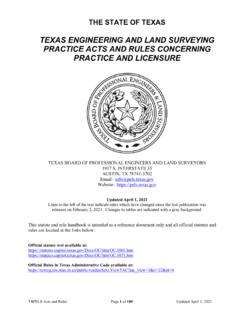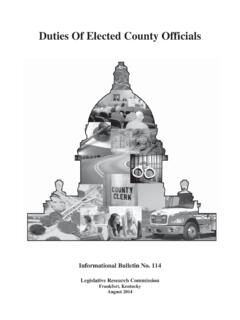Transcription of The Handbook of Communication Skills - uswr.ac.ir
1 The Handbook of Communication SkillsThe Handbook of Communication Skills is recognised as one of the core texts in the field of Communication , offering a state-of-the-art overview of this rapidly evolving field of study. This comprehensively revised and updated fourth edition arrives at a time when the realm of interpersonal Communication has attracted immense attention. Recent research showing the potency of Communication Skills for success in many walks of life has stimulated considerable interest in this area, both from academic researchers and from practitioners whose day-to-day work is so dependent on effective social topics such as non-verbal behaviour, listening, negotiation and persua-sion, the book situates Communication in a range of different contexts, from interact-ing in groups to the counselling interview. Based on the core tenet that interpersonal Communication can be conceptualised as a form of skilled activity, and including new chapters on cognitive behavioural therapy and coaching and mentoring, this new edi-tion also places Communication in context with advances in digital Handbook of Communication Skills represents the most significant single contribution to the literature in this domain.
2 Providing a rich mine of information for the neophyte and practising professional, it is perfect for use in a variety of contexts, from theoretical mainstream Communication modules on degree programmes to voca-tional courses in health, business and education. With contributions from an interna-tionally renowned range of scholars, this is the definitive text for students, researchers and professionals Hargie is Emeritus Professor of Communication at Ulster University. He is Associate Fellow, and honorary life member, of the British Psychological Society, and an elected member of the prestigious Royal Norwegian Society of Sciences and Letters. He was conferred with the award of a Senior Distinguished Research Fellowship by Ulster University in recognition of his prolific research contributions over four Handbook of Communication SkillsFourth EditionEdited by Owen HargieFourth edition published 2019by Routledge2 Park Square, Milton Park, Abingdon, Oxon, OX14 4 RNand by Routledge711 Third Avenue, New York, NY 10017 Routledge is an imprint of the Taylor & Francis Group, an informa business 2019 selection and editorial matter, Owen Hargie; individual chapters, the contributorsThe right of Owen Hargie to be identified as the author of the editorial material, and of the authors for their individual chapters, has been asserted in accordance with sections 77 and 78 of the Copyright, Designs and Patents Act rights reserved.
3 No part of this book may be reprinted or reproduced or utilised in any form or by any electronic, mechanical, or other means, now known or hereafter invented, including photocopying and recording, or in any information storage or retrieval system, without permission in writing from the notice: Product or corporate names may be trademarks or registered trademarks, and are used only for identification and explanation without intent to edition published by Psychology Press 1986 Third edition published by Routledge 2006 British Library Cataloguing-in-Publication DataA catalogue record for this book is available from the British LibraryLibrary of Congress Cataloguing-in-Publication DataA catalog record has been requested for this bookISBN: 978-1-138-21912-0 (hbk)ISBN: 978-1-138-21913-7 (pbk)ISBN: 978-1-315-43613-5 (ebk)Typeset in Century Old Styleby Deanta Global Publishing Services, Chennai, IndiaFor my wife, PatriciaviiContentsContentsNotes on contributors ixEditorial introduction 1 Part ICommunication skill in theory and practice 71 Skill in theory: Communication as skilled performance 9 Owen Hargie2 Skill in practice: An operational model of communicative performance 41 Owen HargiePart IICore Communication Skills 793 Nonverbal behaviour as Communication : Approaches, issues, and research 81 Randall A.
4 Gordon and Daniel Druckman4 Questioning 135 Karyn Stapleton5 Reinforcement 163 Len Cairns6 On explaining 183 George Brown and Sarah Edmundsviii CONTENTS7 Self-disclosure: Strategic revelation of information in personal and professional relationships 217 Charles H. Tardy and Joy Smithson8 Listening 259 Graham D. Bodie9 Humour and laughter 287 May McCreaddie and Jon Harrison10 Persuasion 319 Daniel J. O KeefePart IIIA pplying Skills in specific contexts 33711 Asserting and confronting 339 Richard F. Rakos12 Interacting in task groups 377 Arjaan Wit13 Negotiating 399 Colleen E. Mills14 Mentoring and coaching 423 Bob Garvey15 Relational Communication 451 Steve Duck and Pam L. SecklinPart IVApplying Skills in specialised interviewing contexts 47516 The employment interview 477 Rob Millar and Anne Tracey17 The Cognitive Interview 511 Amina Memon and Julie Gawrylowicz18 The developmental counselling and therapy interview 531 Sandra A.
5 Rigazio-DiGilio and Allen E. Ivey19 Cognitive behavioural Communication Skills 557 Frank Wills20 The appraisal interview reappraised 585 Dennis TourishPart VThe training context 60721 training in Communication Skills : Research, theory and practice 609 Owen HargieIndex 623ixNotes on contributorsGraham D. Bodie is Visiting Professor in the Meek School of Journalism and New Media at The University of Mississippi, Brown is a retired professor, who worked in the School of Education and subsequently in the Department of Medical Education at the University of Nottingham, Cairns is an adjunct Associate Professor in the Faculty of Education at Monash University in Melbourne, Australia, and a Visiting Professor at Middle-sex University, Druckman is Professor Emeritus of Public and International Affairs at George Mason University, Fairfax, Virginia, USA, Honorary Professor at Mac-quarie University, Sydney, Australia, and Honorary Professor at the University of Queensland, Brisbane, Duck is Daniel and Amy Starch Distinguished Research Professor in the College of Liberal Arts and Sciences, and Chair of the Department of Rhetoric, at the University of Iowa.
6 Edmunds is Senior Lecturer in Exercise Psychology at the University of Chichester, Garvey is one of Europe s leading academic practitioners in mentoring and Gawrylowicz is Lecturer in Psychology at Glasgow Caledonian Univer-sity, NOTES ON CONTRIBUTORSR andall A. Gordon is Professor of Psychology at the University of Minnesota, Duluth, USA. He is Executive Editor at the Journal of Social Hargie is Emeritus Professor in the School of Communication , and a member of the Psychology Research Institute at Ulster University, Northern Ireland, Harrison is Senior Lecturer in the School of Nursing and Midwifery at Birming-ham City University, E. Ivey is Distinguished University Professor (Emeritus) at the University of Massachusetts, Amherst, USA. May McCreaddie is Senior Lecturer in the School of Nursing at the Royal College of Surgeons Ireland Medical University of Bahrain, Kingdom of Memon is Professor of Psychology at Royal Holloway, University of London, Millar was Lecturer in the School of Psychology at Ulster University, Northern Ireland, UK, and is now an independent E.
7 Mills is Professor of Management at the University of Canterbury Busi-ness School in Christchurch, New Zealand, and a Faculty International Affiliate (FIA) at Audencia Business School in Nantes, J. O Keefe is the Owen L. Coon Professor of Communication Studies at Northwestern University, F. Rakos is Emeritus Professor in the Department of Psychology at Cleve-land State University, USA, and maintains an active clinical practice as a behaviour A. Rigazio-DiGilio is Professor in the Department of Human Development and Family Studies, Marriage and Family Therapy Programs, at the University of Connecticut, Storrs, L. Secklin is Professor of Communication Studies at St. Cloud State University, Smithson is a data scientist at SchoolStatus, Hattiesburg, Mississippi, USA. Her research interests include financial attitudes, conflict, and power in romantic Stapleton is Senior Lecturer in Interpersonal Communication , and a member of the Language and Linguistics Research Institute, at Ulster University, Northern Ireland, ON CONTRIBUTORS Charles H.
8 Tardy is Professor Emeritus of Communication Studies at The Univer-sity of Southern Mississippi, Tourish is Professor of Leadership and Organisation Studies at the Univer-sity of Sussex, Tracey is a lecturer, researcher, and practitioner based in the School of Psy-chology, Ulster University, Magee Campus, Derry/Londonderry, Northern Ireland, Wills is a CBT therapist living in Bristol but hailing originally from the Wirral, UK. As a life-long supporter of Tranmere Rovers, he is well versed in the prob-lems of anxiety and Wit is Associate Professor in Social and Organisational Psychology and also the Director of Bachelor s and Master s Studies in Psychology at Leiden University, The introductionFe w a r e a s o F a c a d e m i c study have attracted so much atten-tion as that of interpersonal Communication . In recent years there has been a deluge of research studies in this domain.
9 The reasons for this were aptly summarised by Wiemann (2003, p. ix): Our ability to create and sustain our social world depends in large measure on how well we communicate. People s social Skills are crucial to their well-being individually and collectively. The importance of understanding skilled behavior in all its complex-ities cannot be overstated. Competence in Communication is vital for our health, our relationships, and indeed for all of the activities in which we engage as functioning humans (Hannawa & Spitzberg, 2015). Studies have shown a clear and positive rela-tionship between effective interpersonal Skills and a range of benefits such as greater happiness in life, resilience to stress and psychosocial problems, and enhanced academic and professional achievements (M ller, Peter, Cieza, et al., 2015; Hargie, 2017). Indeed, in examining the question as to why we should study this area, the answer given by Stewart, Zediker, and Witteborn (2005) was that we study it because there is a direct relationship between the quality of our Communication and the quality of our relation to the professional sphere, as society develops and becomes more complex, there has evolved the need for a greater num-ber of what Ellis (1980) termed interpersonal professionals , who spend a large part of their working lives in face face interaction with others.
10 Such professionals include doctors, teachers, speech therapists, physio-therapists, occupational therapists, social workers, psychologists, nurses, 2 EDITORIAL INTRODUCTION career advisers, counsellors, and business executives, to name but a few. Historically, the training of many of these professionals focused almost entirely upon the acquisi-tion of specialised knowledge. More recently, however, the centrality of interpersonal Communication in their work has been recognised and catered for in training . As noted by Greene and Burleson (2003, p. xiii): In light of the importance of Communication Skills , it is hardly surprising that they have been a continuing object of study by schol-ars and researchers from numerous disciplines. Competence in most types of profession involves the effective implementation of three main sets of Cognitive Skills . This relates to the knowledge base of the profession, that which characterises it and sets it apart from others.
